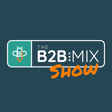
Employee Engagement through Adversity
In this episode, we're talking about employee engagement during times of adversity -- and let's face it, we've all been dealing with a touch of adversity lately with the COVID-19 pandemic upending things on both personal and professional levels. With all this uncertainty, employee engagement can be a bit precarious. When people aren't engaged, productivity lags, and sales and marketing efforts can suffer.
Thankfully, we've got Jacqueline Throop-Robinson joining us to discuss how to manage employee engagement through adversity. Jacqueline, the founder of Spark Engagement, Inc., has a 30-year career focused on uplifting leaders and inspiring passionate engagement at all levels of an organization. As a best-selling author of Fire Up Your Team: 50 Ways for Leaders to Connect, Collaborate and Create with their Teams, Jacqueline strives to create cultures of passion, productivity, and performance.
During our conversation with Jacqueline, we cover:
- Employee engagement levels -- before and during the pandemic
- Employee engagement as part of disaster preparedness planning
- Managing teams and morale during times of uncertainty
- Applying "lessons learned" during the COVID-19 pandemic to future periods of adversity
- and more
Want to connect with Jacqueline online?
- Website: www.sparkengagementindex.com
- LinkedIn: www.linkedin.com/in/jacquelinethroop-robinson/
--
About The B2B Mix Show:
The B2B Mix Show with Alanna Jackson and Stacy Jackson is brought to you by Jackson Marketing. Need help with your B2B online presence? Let's talk!
Connect with us on social media:
The B2B Mix Show -- Twitter, Instagram, LinkedIn, Facebook
















